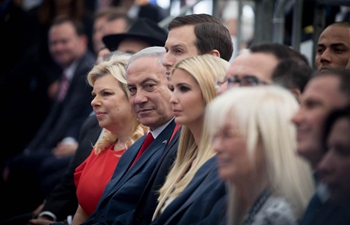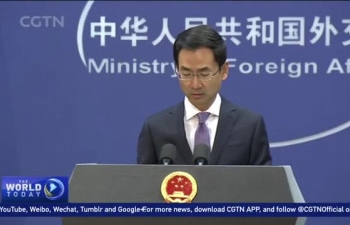LOS ANGELES, May 14 (Xinhua) -- In light of the proposed tariffs on Chinese imports worth about 50 billion U.S. dollars, an East West Bank senior official has called on local businessmen to act to avoid a trade war between the world's two largest economies.
Dominic Ng, CEO of the Los Angeles-based bank among the top five of the Forbes annual list of America's Best Banks 2018, made the appeal in an article sent to Xinhua Monday.
"The prospect of escalating trade frictions between China and the United States is a dark cloud hanging over an otherwise humming global economy," Ng wrote, citing the likelihood of the U.S. implementation of the announced tariffs and following retaliatory measures by China.
He cautioned that a costly worst scenario, "not unthinkable anymore," will hurt consumers and firms in both nations.
Average U.S. consumers would pay more for their clothes, phones and groceries while U.S. exports to China, including agricultural and high-tech products, would be susceptible to Chinese retaliation, he said.
He said that a worst case would also risk some 32 billion dollars in education and tourism expenditures that Chinese nationals spend in the United States each year, as well as almost half a trillion dollars of foreign direct investment (FDI) assets that businesses have built in the past three decades.
U.S. companies have 260 billion dollars worth of hard-to-liquidate factories, research centers and retail shops in China, he said. Also being endangered is the growing Chinese investment in the United States, which has created 140,000 jobs.
The East West Bank CEO meanwhile warned against a dangerous bifurcation of technological ecosystems, saying "a new cold war in technology would be bad for consumers on both sides, and it would severely slow down the pace of global innovation."
In addition, Ng said, escalating economic tensions would affect people's lives beyond economics, since "more aggressive posturing is already producing borderline racist and McCarthyist comments about Chinese students and researchers in the U.S. This will only get worse if frictions escalate and could poison an entire generation of Americans and Chinese towards each other."
He called for productive steps to work on the U.S.-China trade ties.
"Both nations need to separate national security from economics," he said. "Leaders need to negotiate a reasonable policy package that addresses U.S. concerns but also considers China's legacy and development status" and "any deal will need a clear roadmap for implementation."
He meanwhile called on local businessmen to "help our leaders to better grasp the full magnitude of the damages from a serious divorce. Businesses are on the frontlines, and many of us have current data and relevant information grounded in real-time market dynamics that policymakers need to hear."
We must also help leaders understand the real issues and call off "political gamesmanship that does not make sense," he added.
In an exclusive interview with Xinhua in March, Ng said the existing official U.S.-China trade numbers are grossly inaccurate because they are based on outdated methods of data collection and calculation and have not been properly updated to reflect today's global economy.
Citing the 2016 U.S. net trade deficit with China, Ng mentioned the new method for tabulating trade created by the Organization for Economic Cooperation and Development (OECD), saying: "If we assume a stable ratio between traditional and value-added data, then the adjusted U.S. trade deficit in 2016 with China would come down from 309 billion dollars to 169 billion dollars."













